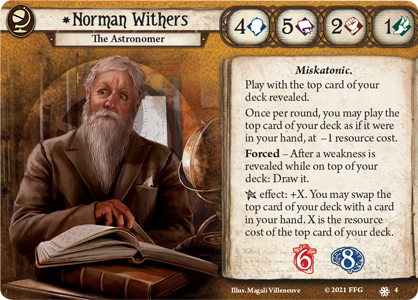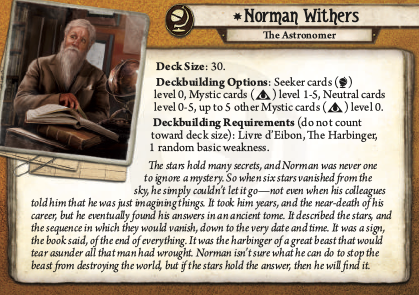- Q: The rules reference and the FAQ both imply that abilities only work during setup if they specifically refer to the setup process. Does this also apply to constant abilities? In particular: Is Norman Withers’ “Play with the top card of your deck revealed.” ability active during setup (e.g. while he’s taking a mulligan)? Is Lola Hayes “You can only play, commit, or trigger abilities on Neutral cards or cards of your role.” ability active during setup (e.g. before drawing her opening hand, when she might trigger the abilities on Stick to the Plan or Ancestral Knowledge)? A: To answer your question(s):
- Norman Withers would not have the top card of his deck revealed during Setup.
- Lola Hayes would not be limited by her constant ability during Setup. She could resolve the abilities on Ancestral Knowledge and Stick to the Plan before drawing her opening hand.
諾曼·威瑟斯
天文學家
調查員
米斯卡塔尼克
- 4
- 5
- 2
- 1
你牌堆頂部的卡牌始終揭示。
每輪1次,你可以-1資源費用打出你牌堆頂部的卡牌,如同其為你的手牌。
強制 - 在你的牌堆頂部揭示弱點後:將其抽取。
效果:+X。你可以用你1張手牌交換你牌堆頂部的卡牌。X為你牌堆頂部卡牌的資源費用。
諾曼·威瑟斯 - 背面
卡牌張數:30。
牌組構建選項:探求者()等級0,潛修者()等級1-5,中立卡牌等級0-5,最多5張其它的潛修者卡牌()等級0。
牌組構建需求(不計入卡牌張數):伊波恩之書,預示者、1張隨機基礎弱點。


Investigator Cards
- Split the Angle: Ire of the Void (Ire of the Void #8)
- Vengeful Hound (Ire of the Void #9)
- 伊波恩之書: 希波利爾的魔法書 (闇與地球之界調查員擴充 #5)
- The Harbinger (闇與地球之界調查員擴充 #6)
牌组构建
Search for cards usable by this investigatorFAQs
(from the official FAQ or responses to the official rules question form)Reviews
I'd like to throw up a review of my favorite investigator once again, as my previous one was lost when his non-Promo version came out.
Despite the color of his card, don't be fooled, Norman is a Mystic Investigator who plays differently at 0 XP. If you are choosing an investigator for Deduction (2), Higher Education, and Segment of Onyx, Norman certainly isn't it. Instead choose him for your Shriveling (5), Armageddon (4), Grotesque Statue (4) strategies. Mystic/Seeker (as opposed to Daisy's Seeker/Mystic) access was somewhat novel when he originally debuted, but it's a bit more common now (as of this writing, Gloria Goldberg: The Writer and Luke Robinson: The Dreamer have similar access).
So let's go through Norman:
- Stats - The first thing to notice about Norman is that he is a true min/maxer. 5 Intellect and 4 Willpower are both very strong, and he's given up his other stats to do it. 2 Fight is almost completely irrelevant. The 1 Agility is sometimes relevant (e.g. Grasping Hands), but for the most part is fine. In exchange, Norman has what I would call "high accuracy". Norman is very likely to succeed at his usual actions, even on harder difficulties because of his high base stats. On easier difficulties, Norman can sometimes investigate with a decent chance of success holding nothing.
- Elder Sign - Norman's Elder Sign is honestly not very good. It gives a small bonus and then you can manipulate the top card of your deck for your static ability. This is close to nothing, and I usually don't bother with cards to try to improve my chance of getting an Elder Sign.
- Static Text - Norman's static text that allows him to play the top card of his deck at -1 resource cost once per turn is quite strong. Each time you use it you have effectively gained 2 actions (1 for "drawing" a new card, and 1 for the resource you didn't have to generate). Norman's deckbuilding should, in my opinion, take heavy consideration toward maximizing this benefit. Since your goal is to use it nearly every turn, consider building it the same way Joe DIamond builds his hunch deck. Maximize cards that can be used at nearly any time, and cards with fast to make the most of it. Skills are quite bad because you can't play them (I often play only Deduction for example). Using this text often is a big part of Norman's power AND fun.
- Forced - This reads like a downside, but it's actually sort of upside. You'll never have a dead draw of a weakness.
Signature Cards:
- Livre d'Eibon/The Harbinger - I admit being surprised how high the review is on Livre d'Eibon. The first fast ability on it is borderline flavor text. The second ability is okay (committing a card from the top of your deck is worse than drawing it), but I don't think it's great, and I think including cards that are great to commit fights against your best text. Livre d'Eibon can be searched for as it is a tome. The Harbinger is extremely mild, but always takes two actions to resolve, and probably needs to be resolved BY YOU each time it's revealed unless it's very late. The Harbinger rarely "pins" you, which is an advantage over Vengeful Hound which rarely does but can.
- Split the Angle/Vengeful Hound - The slow action on Split the Angle is absolutely nothing. The fast action just changes the top card of your deck, don't worry about what it does to the encounter deck. The actions I think are meant to be used together, but they're just too slow. I commit Split the Angle a lot, unless I draw it early. Vengeful Hound is hard to solve if you have nothing in play (you need 0s to punch it, and +2s to evade it), but if you have absolutely anything in play it can be solved easily, often in one action (Shriveling) or no actions (e.g. Shriveling + Knowledge is Power). In addition, unlike the Harbinger your allies can help you with Vengeful Hound. The fighter may have nothing to kill anyway.
- Final Result - I don't think you're playing Norman for either one of these Signatures, as I think they're both low impact. I understand the appeal of The Harbinger, as you can resolve it without a test, but the Hound requires so little of you, and can be solved by your allies (Edit: In the comments someone said that the text does allow Allies to help you with Harbinger. We didn't read it that way originally, and played it as yourself only because it wasn't on top of "their" deck. I still think Livre isn't worth the hype). Overall, unless I'm specifically building around Livre d'Eibon, I prefer to play Split the Angle and Vengeful Hound.
Choices For 5 Mystic Level 0 Cards:
- Read the Signs - You combine for 9, ignore a ton of bad stuff, plays off the top of your deck for 1 resource, and gives you action compression. An easy include.
- Spectral Razor - Sometimes the three damage is relevant, and gives you a few outs to combat.
- Delve Too Deep - XP is very good, and Norman uses XP well.
- St. Hubert's Key - Synergy with Read the Signs, and a boost to your best skills. KO protection. Sometimes I throw it out when I pull my Delves.
- Open Gate - Worth mentioning as if you pivot off of several level 0s it restocks for only 1 XP. It's Fast, and on some scenarios it's quite good.
- Arcane Research - I'm not sure how popular it is now, but it used to see some play for Norman. I personally am not a fan. It takes a slot forever, and because of your limited access to level 0 spells you might later upgrade, it's pretty clunky. I would skip it.
Final Thoughts:
- Scrying/Protective Incantation/Support Builds - Seeing Norman builds that use these cards drive me crazy. In my opinion, these sorts of cards are best used by characters who are bad at tests either because of stats, or because of card access. That's not Norman. An ideal Norman turn maximizes his strength at taking tests, and utilizes his static text; play the top card of your deck, and take two or three tests with Intellect or Willpower is perfect. Stay away from these support type builds, or use a different investigator.
- Norman is both very fun, and very powerful. He might look like another Gloria nerd, but he solves problems very differently. Norman is at his best brute forcing problems, and I love playing him.
- Try Norman today!